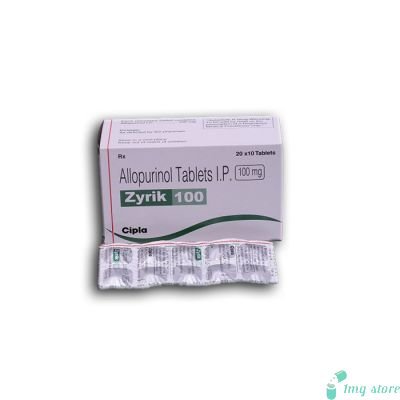Zyloric Tablet (Allopurinol)
Buy Allopurinol, marketed under various brand names such as Zyloric, Lopurin, and Zyloprim, is a medication primarily prescribed for the treatment of conditions related to excess uric acid production and deposition in the body.
What is Allopurinol Tablet (Zyloric)?
Allopurinol, marketed under various brand names such as Zyloric, Lopurin, and Zyloprim, is a medication primarily prescribed for the treatment of conditions related to excess uric acid production and deposition in the body. This comprehensive guide provides detailed information about Allopurinol tablets, including dosage instructions, usage, potential side effects, precautions, and drug interactions. Allopurinol is primarily prescribed for the treatment of Gout, a type of Arthritis caused by the accumulation of excess uric acid crystals in the joints. It works by inhibiting the enzyme xanthine oxidase, which plays a key role in uric acid production.
Allopurinol Dosage Information
Dosage Recommendations: The dosage of Allopurinol varies depending on the individual's condition and response to treatment. The typical starting dose for adults is 100 to 300 milligrams daily, taken as a single dose or divided into multiple doses. The dosage can be adjusted based on the serum uric acid levels and the patient's tolerance to the medication.
Missed Dose: If a dose is missed, it should be taken as soon as remembered. However, if it's close to the next scheduled dose, the missed dose should be skipped and the regular dosing schedule should be resumed. Doubling the dose to make up for a missed one is not recommended, as it can lead to adverse effects.
Overdose: In case of an overdose, medical attention should be sought immediately. Symptoms of an overdose may include severe dizziness, nausea, vomiting, diarrhea, and joint pain. Overdosing on Allopurinol can lead to serious complications, and medical supervision is crucial.
Allopurinol for Sale:
Allopurinol, a medication used to manage conditions related to excess uric acid, is available for purchase on 1mgstore.com. This online platform provides a convenient way to access the medication and have it delivered to your doorstep, ensuring ease of obtaining essential healthcare products.
Allopurinol Brand Names:
Allopurinol is marketed under various brand names such as Zyloric, Lopurin, and Zyloprim. These different brand names refer to the same active ingredient, offering patients options while seeking the medication. It's important to note that regardless of the brand name, the medication's intended effects and precautions remain consistent.
Some of the precautionary measures to be taken while using a Zyloric Tablet (Allopurinol)
- Allergic Reactions: Individuals with a history of allergic reactions to Allopurinol should avoid the medication. Hypersensitivity reactions can be severe and life-threatening.
- Kidney and Liver Impairment: Patients with kidney or liver problems should be monitored closely while taking Allopurinol, as dose adjustments may be necessary to prevent adverse effects.
- Pregnancy and Breastfeeding: Allopurinol should be used with caution during pregnancy and breastfeeding, as its safety in these conditions is not well-established. The potential benefits and risks should be discussed with a healthcare provider.
- Fluid Intake: Adequate fluid intake is important while taking Allopurinol to maintain proper hydration and promote the excretion of uric acid.
- Initial Worsening of Symptoms: Some individuals may experience an initial exacerbation of gout symptoms when starting Allopurinol. This is temporary and is due to the dissolution of uric acid crystals.
Some of the specific indications for Zyloric Tablet (Allopurinol) include
- Gout: Allopurinol is primarily prescribed for the treatment of gout, a type of Arthritis caused by the accumulation of excess uric acid crystals in the joints. It works by inhibiting the enzyme xanthine oxidase, which plays a key role in uric acid production.
- Hyperuricemia: Hyperuricemia, or elevated levels of uric acid in the blood, can lead to the development of gout and kidney stones. Allopurinol is used to manage hyperuricemia by reducing uric acid production and preventing related complications.
- Kidney Stones: Allopurinol may be prescribed to prevent the formation of uric acid kidney stones, which can result from high levels of uric acid in the urine.
- Lesch-Nyhan Syndrome: This rare genetic disorder leads to excessive uric acid production, causing various health issues. Allopurinol can help lower uric acid levels in individuals with this syndrome.
- Chemotherapy-Related Hyperuricemia: Certain cancer treatments can cause rapid cell breakdown, leading to increased uric acid levels. Allopurinol can be used in cancer patients to prevent hyperuricemia-associated complications.
Some of the Secondary Effects of Zyloric Tablet (Allopurinol)
- Common Side Effects: Mild side effects may include nausea, vomiting, diarrhea, and drowsiness. These effects are usually transient and tend to improve as the body adjusts to the medication.
- Serious Side Effects: Rarely, severe skin reactions such as Stevens-Johnson syndrome and toxic epidermal necrolysis can occur. Allergic reactions, liver problems, and changes in blood cell counts are also possible but uncommon.
- Hypersensitivity: Some individuals may experience a hypersensitivity reaction to Allopurinol, characterized by rash, fever, and systemic symptoms. This reaction can be severe and requires immediate medical attention.
- Renal and Hepatic Effects: Allopurinol should be used with caution in patients with kidney or liver impairment, as it can affect the excretion of the medication and its metabolites.
- Interaction with Other Medications: Allopurinol may interact with certain drugs, such as azathioprine and mercaptopurine, leading to increased levels of these medications in the body. This can potentially result in toxicity and adverse effects.
Answers to Common Inquiries about Allopurinol Tablets
Q1. Can Allopurinol tablets be taken on an empty stomach?
Answer: Yes, Allopurinol can be taken with or without food. However, to reduce the risk of stomach upset, taking it with food or after a meal is recommended.
Q2. Is Allopurinol safe for children with hyperuricemia?
Answer: Allopurinol is generally not recommended for children with hyperuricemia. Its use in pediatric patients is limited and requires careful consideration by a healthcare provider due to potential risks and lack of sufficient data.
Q3. Can Allopurinol be used for acute gout attacks?
Answer: Allopurinol is not suitable for treating acute gout attacks. It's intended for long-term management and prevention of gout by reducing uric acid levels. Acute gout attacks are typically treated with anti-inflammatory medications.
Q4. Are there any dietary restrictions while taking Allopurinol?
Answer: While there are no strict dietary restrictions, consuming excessive amounts of alcohol, high-purine foods (e.g., organ meats, shellfish), and sugary beverages may impact the effectiveness of Allopurinol. A balanced diet and staying hydrated are generally advised.
Q5. Can Allopurinol be discontinued once uric acid levels normalize?
Answer: No, Allopurinol should not be abruptly stopped once uric acid levels are controlled. Stopping the medication suddenly can lead to a resurgence of gout symptoms and increased uric acid levels. Consult a healthcare provider before making any changes to the treatment plan.
Significant Drug Interactions that Require Attention For Zyloric Tablet (Allopurinol)
- Azathioprine and Mercaptopurine: Allopurinol can inhibit the metabolism of these medications, leading to increased levels in the body. Dose adjustments are often needed to prevent toxicity.
- Warfarin: Allopurinol may interact with warfarin, an anticoagulant, potentially altering its effects. Close monitoring of blood clotting parameters is advisable if these medications are used together.
- Diuretics: The combination of Allopurinol with certain diuretics can increase the risk of hypersensitivity reactions. This combination should be used with caution and monitored closely.
- Theophylline: Allopurinol can prolong the half-life of theophylline, a medication used for respiratory conditions. Monitoring theophylline levels is recommended when starting or adjusting Allopurinol therapy.
- Cyclosporine and Amoxicillin: Allopurinol may affect the metabolism of cyclosporine and amoxicillin, potentially requiring dosage adjustments of these medications.
| Manufacturer | : | GSK Pharma, India |
| Equivalent Brand | : | Lopurin |
| Generic Search | : | Allopurinol |












